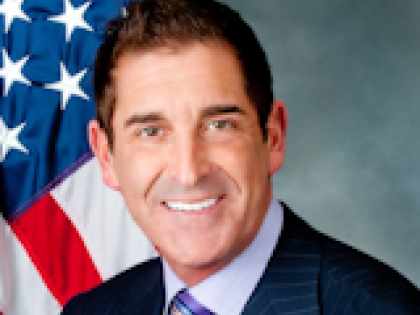
For Health Or Money?
Jeffrey D. Klein
May 17, 2008

Klein Releases Report on How New York HMOs Disproportionately Deny Ethnic Minorities Access to Life Saving Drugs
NEW YORK- Senator Jeff Klein (D-Bronx/Westchester) Senator Tom Duane (D-Manhattan), Senator John Sabini (D-Queens), joined by several patients, doctors, and pharmacists, released a report, For Health or Money, a comprehensive analysis of New York’s 19 major HMOs and the life threatening restrictions on what are known as “single source drugs”. Single source drugs are unique medications for which there are no generic alternatives.
Lipitor, for example, is the most commonly prescribed prescription drug to reduce cholesterol and prevent heart disease. It is also a single-source drug with no generic equivalent. While there are other medications (called “statins”) that reduce cholesterol, it is believed that Lipitor’s unique active ingredient makes it especially effective for certain patients, particularly those with acute coronary syndrome or those that have already had a heart attack
Klein’s report reveals that insurance companies are denying or restricting access to these medications which in many cases disproportionately impact minority communities which suffer from cardiovascular disease, HIV/AIDS, high cholesterol, diabetes, depression, and asthma.
According to the Center for Disease Control and Prevention’s Summary Health Statistics for U.S. Adults: 2006, 31.6% of non-Hispanic blacks, age 18 and over suffer from heart disease as compared to only 22.4 %of non-Hispanic whites. The American Hearth Association lists diseases of the heart and stroke as the No. 1 killer of Latino/Hispanic Americans. They claim the lives of 28.6 percent of the more than 122,000 Hispanics or Latinos who die each year, with cancer follows, at19.7 percent. On average, Hispanic Women develop pre-hypertension indicators such as obesity ten years earlier than White women, at a rate of 32% contrasted to the incidence in White women at 17%.
Similarly, there is repeated evidence of the connection between poverty and poor health such as obesity, a high sugar diet which can lead to diabetes and heart disease, exposure to pollution and other toxins which contribute to respiratory ailments and asthma, as well as depression.
“Health care should not come at the cost of the patient’s health. These are not drugs which treat complicated or rare conditions, but common diseases which happen to occur more frequently in African Americans and Hispanics communities. In essence health insurance companies are holding up minority communities like common criminals, and asking: ‘your money or your life?’”
Klein’s report analyzes the standard formularies which insurance companies use to categorize drugs. Formularies are typically comprised of three tiers with Tier 1 consisting of generic medications, Tier 2 consisting of proprietary (brand name) medications, and Tier 3 including proprietary drugs for which no generic exists as well as other more expensive medications.
Patients pay the least for Tier 1 drugs, while paying more for Tier 2 drugs, and even more for Tier 3 drugs which are typically called non-preferred. For some employee and individual benefit plans, Tier 3 drugs may not be covered. Other restrictions include: Medical Exception; whereby a patient and doctor request a medical exception, which must then be granted by the insurance company; Prior Authorization/Pre-Certification of the drug by the insurance company, Quantity Limitations, and Step Therapy (Step Protocol): prerequisite medications (one or more) prior to approval of the physician-prescribed drug.
Of the major HMOs operating in New York, 14 place restrictions on medications that are disproportionately required by African-American and Hispanic-American New Yorkers.
Of the largest Insurers, Oxford had the most restrictions on drug coverage, placing restrictions on 13 of the 19 single source drugs needed to treat conditions from which African Americans and Hispanic Americans disproportionately suffer, and 18 restrictions overall.
Aetna and Health Net are tied at second place with a total of 17 restrictions each on 10 and 13 drugs respectively. Finally, Independent Health Association restricts access to 12 drugs for a total of 16 restrictions overall.
Oxford and Independent had the most drugs listed under the expensive third tier, 9 and 4 drugs respectively.
GHI, Aetna, and Excellus listed the largest requirement of step therapy, while Independent required prior authorization most frequently.
Health Net had the highest incidence of quantity restrictions, placing limits on 13 medications, followed by Aetna (10) and Oxford (9).
Of the drugs surveyed Lipitor and Singulair are the most restricted. Lipitor was restricted by 8 of the 15 companies, with a total of 19 restrictions. Singulair, a preventative medication for asthma, has 14 restrictions by 11 companies that limit access.
For the 9 medications for mental health-related conditions, 12 companies had restrictions in place. There was a total of 14 restrictions placed on Lexapro by 10 different companies. Abilify and Cymbalta were restricted by 8 HMOs totaling 10 and 11 restrictions each.
"Rates of illness are especially high in diverse communities like the ones I represent," said Senator John D. Sabini (D/I-Queens). "When HMO's restrict access to medicines for those who need them the most, they're continuing this vicious cycle. It's up to us as leaders to break this cycle and make sure our most vulnerable members of society have equal access to the medicines they need."
The Senators proposed legislation which would require that all medically necessary prescription medications approved by the FDA be covered by the insurance company. Similarly, coverage of medications requiring step therapy will be guaranteed following the doctor/patient compliance with such requirements.
To address the fact that insurance providers are able to alter their formulary at any time without regard to their patients’ current treatment regimens, the legislation would require that insurance providers will submit their formulary to the NYS Department of Insurance annually. In addition, it would forbid insurance companies from altering the formulary during the year, except in instances where new drugs become available or where single-source drugs lose their patents and generics become available.
Similarly, if a patient is currently taking a single-source drug, and the insurance company alters the formulary so that the coverage of the drug is restricted or denied, the patient will have the right to continue using the drug under the terms that existed before the change.
Lastly, the State Insurance Department will review and approve an insurance providers’ definition of “medical necessity.” Upon denial of coverage, the insurance provider will submit the reasons for denial according to the NYS Department of Insurance guidelines.
Share this Article or Press Release
Newsroom
Go to NewsroomSENATOR JEFF KLEIN HOSTS HEROIN TOWN HALL
September 21, 2016

SENATOR KLEIN HOSTS BACK TO SCHOOL CELEBRATIONS AND SCHOOL SUPPLY GIVEAWAYS
September 21, 2016

SENATOR JEFF KLEIN HOSTS SIXTH ANNUAL FIRST RESPONDER APPRECIATION BARBECUE
September 20, 2016

